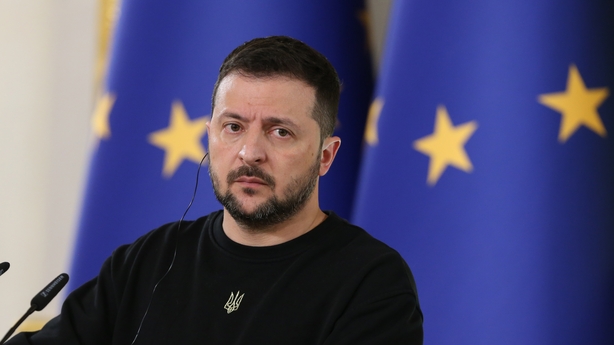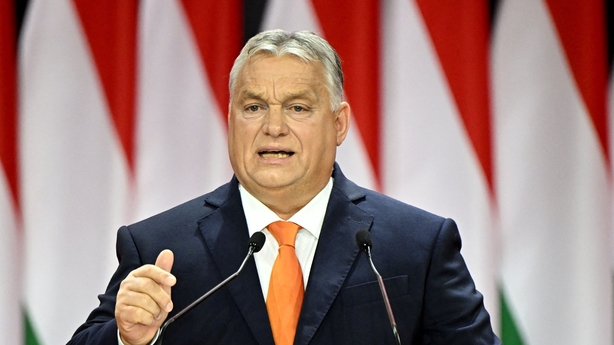President Volodymyr Zelensky has hailed a "victory" for Ukraine and the European continent after European Union leaders agreed to open membership talks for Ukraine and Moldova despite months of opposition from Hungary about Kyiv joining.
The decision announced by European Council President Charles Michel on the first day of a summit in Brussels is a much-needed morale boost for Kyiv, which fears vital Western support has been waning as its war with Russia rages on with no end in sight.
"I thank everyone who worked for this to happen and everyone who helped. I congratulate every Ukrainian on this day... History is made by those who don't get tired of fighting for freedom," Zelensky wrote in a post on social media platform X.

In a separate post on X, the president added: "This is a victory for Ukraine. A victory for all of Europe. A victory that motivates, inspires, and strengthens."
It was not immediately clear what the fate was of a four-year €50 billion aid package that Kyiv hopes will also be agreed by EU leaders at the summit this week.
Ukraine announced its wartime bid to join the EU days after Russia launched its full-scale invasion in February 2022.
"This is an extremely important milestone on our common path to the unification of Europe... When we started it, no one believed we'd succeed. But we didn't care," President Zelensky's chief of staff Andriy Yermak said.
Kyiv has been racing to agree and adopt legislative reforms in recent weeks to meet the criteria for talks to be launched but had faced staunch opposition from Hungarian Prime Minister Viktor Orbán.
Ukrainian Foreign Minister Dmytro Kuleba said: "What a historic day! One emotion dominates: everything was not in vain."
Deputy Prime Minister Olha Stefanishyna said: "(This) became possible only thanks to the strong will of all Ukrainians, our soldiers standing on the frontline."
Russia, which has occupied more than a sixth of Ukraine's territory, is a fierce opponent of Ukraine's push to join Western institutions like the NATO military alliance.
Moscow's troops seized and annexed the Ukrainian peninsula of Crimea in 2014 following mass protests in Kyiv that toppled a Russian-backed leader who had abandoned a push to sign an association agreement with the European Union.
Moldova, which lies between Ukraine and Romania, hailed the EU decision to open formal accession talks with it. Pro-Western President Maia Sandu said Moldova would rise to the challenge and was committed to the "hard work" that lay ahead.
"Moldova turns a new page today with the EU's go-ahead for accession talks. We're feeling Europe's warm embrace today. Thank you for your support and faith in our journey," Ms Sandu wrote on X.
Taoiseach Leo Varadkar said: "Very significant news. Talks can now begin with Ukraine and Moldova on joining the EU.
"It will be a big boost for morale to know that Europe believes their rightful place is with us in our common home."
Speaking on RTÉ's Six One News, Mr Varadkar described the move as a "breakthrough" that came "quicker than any of us expected".

He said the decision to begin accession talks with Ukraine and Moldova was a "real boost for people living in those countries to know that we here, in the European Union believe that their place is with us".
He added that it was a geo-strategic message, not just to Moscow but to the "world as a whole".
"When the European Union says that we stand for democracy, we do. And when we say that we stand alongside Ukraine for as long as it takes, we mean that."
"A really important decision, and glad we were able to make it here today at this very historic meeting."
He said Prime Minister Viktor Orbán disagreed with the decision but decided not to use his veto power.
"I have to say I respect the fact, that he did not do that because it would have put us, I think in a very difficult position as a European Union," the Taoiseach said.
Mr Varadkar said for people in Ukraine fighting and on the front line, this will be a "big morale boost for them and will give them hope and heart going into what is going to be a very tough winter for them as Putin doubles down on his war".
The European Commission has come in for criticism for releasing €10 billion in funds for Hungary, part of €30 billion overall which have been frozen due to concerns about the rule of law and independence of the judiciary in Hungary, on the eve of the summit.
However, Commission officials have insisted the funds were unfrozen due to judicial reforms in Hungary and that the timing was coincidental.
Earlier, the Taoiseach said he had discussed the matter this morning with Commission President Ursula von der Leyen and Budget Commissioner Johannes Hahn.
"The rules are the rules. Hungary is entitled to certain monies, and they're linked to certain rules," Mr Varadkar said.
"If they fulfill the criteria, the money flows. The timing is not good, because of course, the perception is that this is some sort of incentive to Hungary to support certain positions. But that's actually not the case."
The summit is also focusing on the war in Gaza, with Ireland, and other member states, pressing for an urgent humanitarian ceasefire.
There will not be unanimity for that. At Tuesday’s vote in the UN General Assembly on a ceasefire resolution, European countries were divided, but there was a noticeable shift in support for a ceasefire compared to a similar vote in October.
EU agrees fresh round of sanctions on Russia
EU leaders also agreed to impose a 12th round of sanctions on Russia over the war on Ukraine, targeting diamond exports and better enforcing an oil price cap.
The 27 leaders said in a statement issued during their summit in Brussels that they "welcomed" the approval of the fresh sanctions on Moscow.
The European Union has imposed an unprecedented battery of sanctions against Russia since President Vladimir Putin launched an all-out invasion of Ukraine in February 2022.
The latest sanctions, which still have to be formally published, are set to ban Russia's lucrative diamond exports.
They also include measures aimed at tightening enforcement of an oil price cap aimed at curbing the amount of revenue the Kremlin rakes in from crude sales to non-EU countries.
European diplomats warn the EU is running out of further sectors it can agree on targeting.
Russia's economy has so far weathered the West's punishment and Mr Putin boasted that the country could "move forward".
Decision making
The EU decides on most things by qualified majority - at least 15 of the EU's 27 countries, representing at least 65% of the bloc's population.
But on foreign and security policy, taxes, EU finances, some areas of justice and home affairs, social security, enlargement and changes to EU treaties, a single veto can scuttle change.
Unanimity is already difficult among the 27 EU members and if eight candidate countries join, unanimity among 35 would be even harder.
If you add two countries still awaiting candidate status, it would be harder still at 37.
One of the ideas discussed is therefore to decide everything by qualified majority.
Another is to use existing special "passerelle clauses" to bypass the unanimity requirement.
Such clauses in EU treaties allow the alteration of a legislative procedure without a formal amendment of the treaties.
Yet another proposal is to change the number of votes needed to form a blocking minority - from the current system of 55% of member states representing 65% of the EU population, to 60% of countries representing 60% of the population.
The EU will also have to re-think the number of seats in the European Parliament and probably also the number of commissioners in the executive European Commission, where each member state now has one.






